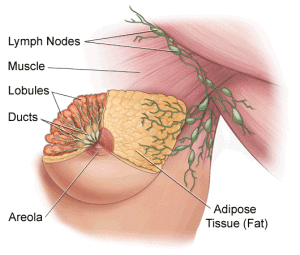Triple Negative Breast Cancer
Scientists from the UK recently have discovered a novel gene that, when mutated, can drive development and progression of triple-negative breast cancer – an aggressive form of the disease that accounts for 10-20% of breast cancers…
Triple-negative breast cancer is when cancer growth does not involve estrogen receptors, progesterone receptors and human epidermal growth factor (HER2) receptors; , triple-negative breast cancer does not respond to hormone therapy, meaning individuals with this subtype have a poorer prognosis than those with other subtypes. Basal cell breast cancer is the most common form of triple-negative breast cancer.
 The study researchers – including joint first author Dr. Walid Khaled of the Welcome Trust Sanger Institute and the University of Cambridge in the UK – note that scientists are in the process of investigating new ways to treat triple-negative breast cancer.
The study researchers – including joint first author Dr. Walid Khaled of the Welcome Trust Sanger Institute and the University of Cambridge in the UK – note that scientists are in the process of investigating new ways to treat triple-negative breast cancer.
For this latest study, published in the journal Nature Communications, Dr. Khaled and colleagues took a different approach to identifying such genes; they assessed alterations to genes that influence the actions of stem cells and developing tissues, as past research from the team has indicated that these alterations affect cancer development.
Reducing BCL11A activity found to reduce cancer-like behavior
By assessing these gene alterations among breast cancer cells from over 3,000 patients, the team found that a gene called BCL11A was particularly active in triple-negative breast cancer.
Fast facts about triple-negative breast cancer
- Triple-negative breast cancer is more likely to occur before the age of 40 or 50, while other breast cancers are more common among people over the age of 60
- People with a BRCA1 gene mutation are at increased risk of triple-negative breast cancer
- Treatment for triple-negative breast cancer usually involves a combination of surgery, radiation therapy and chemotherapy.
Increased BCL11A activity was identified in around 8 out of 10 basel-like breast cancers and was associated with more aggressive tumors, according to the researchers. “Our gene studies in human cells clearly marked BCL11A as a novel driver for triple-negative breast cancers,” says Dr. Khaled.
What is more, when the team reduced BCL11A activity in three samples of human triple-negative breast cancer cells, they found that these cells lost some cancer-like characteristics. When these cells were introduced to mice, they were less likely to drive tumor growth.
“So by increasing BCL11A activity we increase cancer-like behavior; by reducing it, we reduce cancer-like behavior,” explains Dr. Khaled.
This finding was confirmed with further experiments in mice; when the rodents’ BCL11A genes were inactivated, tumor growth was stalled in their mammary gland. Mice that did not have this gene inactivated, however, developed tumors.
In addition, the researchers found that BCL11A is important for the normal development of breast stem cells and progenitor cells. Past studies have shown that mutations in these cells may drive the development of basel-like cancers.
Commenting on their findings, study author Prof. Carlos Caldas, of the University of Cambridge and the Cancer Research UK Cambridge Institute, says:
“This exciting result identifies a novel breast cancer gene in some of the more difficult-to-treat cases. It builds on our work to develop a comprehensive molecular understanding of breast cancer that will inform clinical decisions and treatment choices.
Finding a novel gene that is active in cancer should also help in the search for new treatments.”
Scientists link proteins that keep cells multiplying to cancer
Cancer is a disease where cells become abnormal and multiply out of control. Until now it was thought the proliferation of cancer cells was controlled by transcription factor proteins. But now a new study suggests another family of proteins may also be involved.
The researchers suggest the Musashi proteins may force cancer cells to change to and remain locked in a state where they multiply at a faster rate.
Cells in states of increased proliferation are often seen in cancer and embryonic development. Until this study, biologists thought cells were put in this state by transcription factors – proteins that switch genes on and off by acting on DNA to control the rate at which DNA-encoded instructions are transcribed to messenger RNA to relay to cell processes.
But the new study shows that Musashi proteins – a family of RNA-binding proteins that influence gene expression by acting on RNA messenger molecules – also seem to be able to lock cells into a state of faster proliferation.
There are about 500 different RNA-binding proteins in human beings.
Co-lead author Dr. Yarden Katz, of MIT’s Department of Brain and Cognitive Sciences, says scientists are beginning to find there is a lot of RNA processing going on in mammal cells: “RNA is processed at several points within the cell, and this gives opportunities for RNA-binding proteins to regulate RNA at each point. We’re very interested in trying to understand this unexplored class of RNA-binding proteins and how they regulate cell-state transitions.”
They found changes to Musashi protein levels altered genes associated with a process through which cells transform from a state where they stick to each other to a state where they become loose and travel easily. The process is called epithelial-to-mesenchymal transition (EMT).
Dr. Katz says it is too early to say whether Musashi proteins would make good targets for cancer drugs – but they may be useful as markers to help diagnose what state cancer cells are in:
“It’s more about understanding the cell states of cancer at this stage, and diagnosing them, rather than treating them,” he explains.


